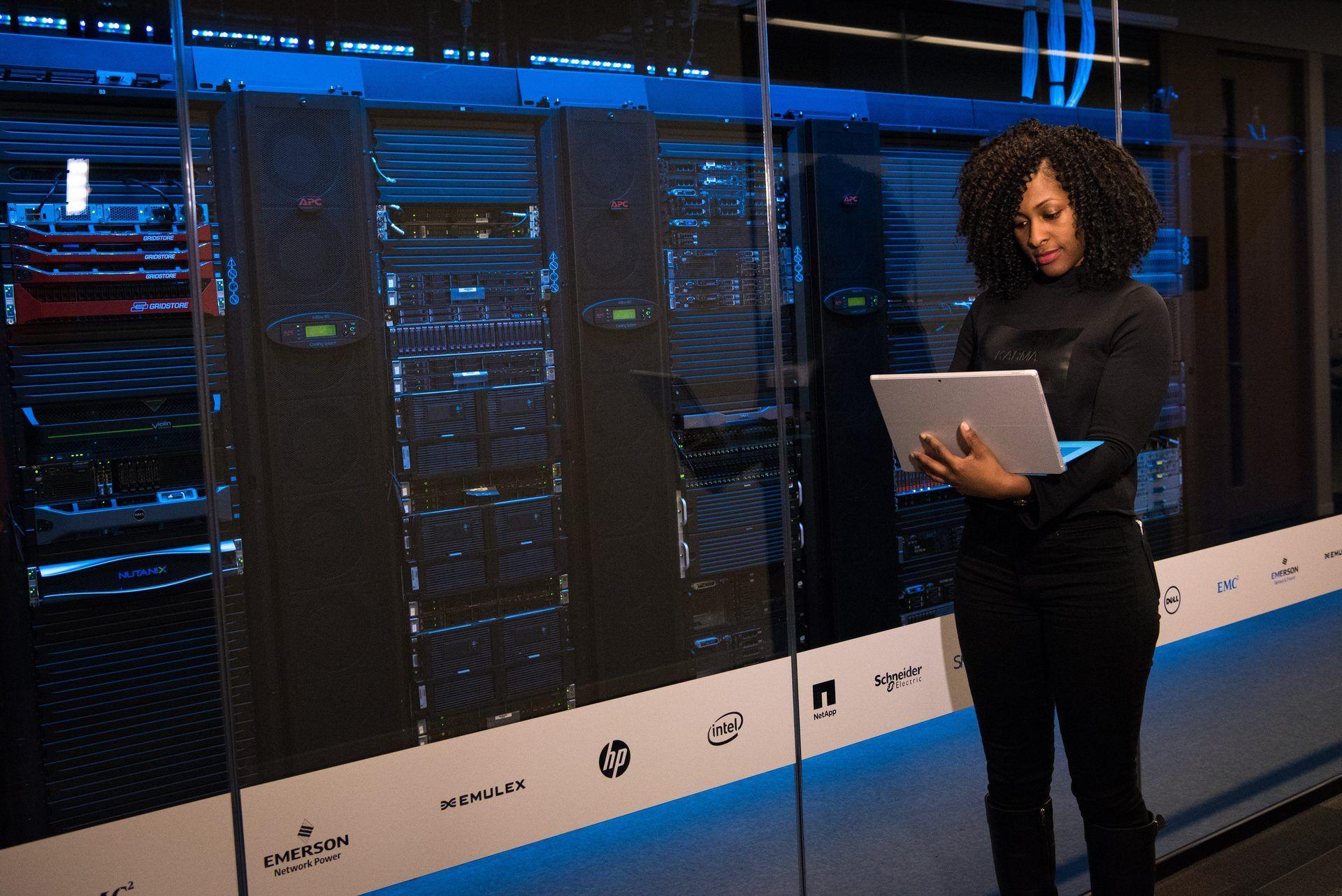Today’s question is, “What does a data scientist do.” Step into the realm of data science, where numbers dance like fireflies and patterns emerge from the chaos of information. In this blog post, we’re embarking on a thrilling expedition to demystify the enigmatic role of data scientists. Think of them as modern-day detectives, archeologists, and alchemists combined, all working their magic to decipher the language of data and unearth the gems hidden within.
Imagine a locked door behind which lies a wealth of secrets waiting to be discovered. Data scientists are the master keyholders, unlocking this portal to reveal the mysteries within. They wield algorithms like ancient incantations, summoning patterns from the chaos and crafting narratives from raw numbers. With a blend of technical prowess and analytical acumen, they unravel the most intricate puzzles hidden within the data landscape.
But make no mistake; data science is not a solitary endeavor; it’s a ballet of complexities and creativity. Data scientists waltz through intricate datasets, twirling with statistical tools and machine learning techniques. They craft models that predict the future, using their intuition as partners in this elegant dance of prediction and possibility.

Prepare to be amazed as we unravel the mysteries and unveil the fascinating world of data science, where data isn’t just numbers; it’s a portal to a universe of insights and possibilities.? Keep reading and learn everything you need to answer the million-dollar question, what does a data scientist do?
What is a data scientist?
At its core, a data scientist is a skilled professional who extracts meaningful insights and knowledge from complex and often large datasets. They bridge the gap between raw data and valuable insights, using a blend of technical skills, domain knowledge, and analytical expertise. Imagine data scientists as modern-day detectives who sift through a sea of information to uncover hidden patterns, trends, and correlations that can inform decision-making and drive innovation.
Data scientists utilize a diverse toolbox of techniques, including statistical analysis, machine learning, data visualization, and programming, to tackle a wide range of challenges across various industries. They possess a unique ability to transform data into actionable insights, helping organizations make informed choices, solve complex problems, and predict future outcomes.

In a nutshell, a data scientist is:
- A problem solver: Data scientists tackle real-world problems by designing and implementing data-driven solutions. Whether it’s predicting customer behavior, optimizing supply chains, or improving healthcare outcomes, they apply their expertise to solve diverse challenges.
- A data explorer: Much like explorers of old, data scientists venture into the unknown territories of data. They dive deep into datasets, discovering hidden treasures of information that might not be apparent to the untrained eye.
- A model builder: Data scientists create models that simulate real-world processes. These models can predict future events, classify data into categories, or uncover relationships between variables, enabling better decision-making.
- An analyst: Data scientists meticulously analyze data to extract meaningful insights. They identify trends, anomalies, and outliers that can provide valuable information to guide business strategies.
- A storyteller: Data scientists don’t just crunch numbers; they are skilled storytellers. They convey their findings through compelling visualizations, reports, and presentations that resonate with both technical and non-technical audiences.
- An innovator: In a rapidly evolving technological landscape, data scientists continuously seek new ways to harness data for innovation. They keep up with the latest advancements in their field and adapt their skills to suit the ever-changing data landscape.
Data scientists play a pivotal role in transforming raw data into actionable knowledge, shaping industries, and guiding organizations toward data-driven success. As the digital world continues to expand, the demand for data scientists is only expected to grow, making them a crucial driving force behind the future of innovation and decision-making.
Wondering, “What does a data scientist do?” Look no further – they manipulate data, build models, and drive informed decisions.
What does a data scientist do: Responsibilities and duties
“What does a data scientist do?” The answer encompasses data exploration, feature engineering, and model refinement. In the grand performance of data science, data scientists don multiple hats, each with a unique flair that contributes to the harmonious masterpiece.

- Data collection and cleaning: Data scientists kick off their journey by embarking on a digital excavation, unearthing raw data from the digital landscape. Just like sifting through ancient artifacts, they meticulously clean and refine the data, preparing it for the grand unveiling.
- Exploratory Data Analysis (EDA): Like intrepid explorers wandering through an uncharted forest, data scientists traverse the terrain of data with curiosity. They create visualizations that resemble vibrant treasure maps, unveiling trends, anomalies, and secrets hidden within the data’s labyrinth.
- Model development: Crafting magic from algorithms! Picture data scientists as wizards conjuring spells from algorithms. They build models that can predict the future, classify the unknown, and even find patterns in the seemingly chaotic.
- Feature engineering: In the alchemical process of data science, data scientists are the masters of distillation. They transform raw ingredients (data) into refined essences (features) that fuel their predictive concoctions.
- Machine learning and AI: Are you ready to casting predictive spells? Enter the realm of enchantment where data scientists train machine learning models. It’s a bit like teaching a dragon to dance – a careful choreography of parameters and data to breathe life into these models.
- Evaluation and optimization: Data scientists embark on a quest to fine-tune their creations. It’s a journey of trial and error, with the goal of crafting models that are as accurate as a marksman’s arrow.
- Communication and visualization: Data scientists don’t just crunch numbers; they weave tales. Like master storytellers, they craft visualizations and reports that captivate the minds of decision-makers and stakeholders.
At the nexus of technology and analysis, the solution to “What does a data scientist do?” becomes clear: they wield data as a compass.
Is data science a good career?
What does a data scientist do: The impact on industries
The impact of data scientists extends far and wide, like ripples from a stone cast into a pond.

Let’s explore the realms they conquer:
- Healthcare: Data scientists are like healers armed with foresight in healthcare. They predict disease outbreaks, patient outcomes, and medical trends, aiding doctors in delivering timely interventions.
- Finance: Imagine data scientists as financial wizards, foreseeing market trends and curating investment strategies that seem almost magical in their precision.
- Retail and e-commerce: In the world of retail, data scientists craft potions of customer satisfaction. They analyze buying behaviors and concoct personalized recommendations that leave shoppers spellbound.
- Manufacturing: In manufacturing, data scientists work like production sorcerers, optimizing processes, reducing defects, and ensuring every cog in the machinery dances to the tune of efficiency.
- Social Sciences: Data scientists are also modern-day Sherlock Holmes, helping social scientists unravel the mysteries of human behavior, from sentiment analysis to demographic shifts.
Exploring the multifaceted answer to “What does a data scientist do?” reveals their pivotal role in turning data into informed decisions.
What is a data scientist salary?
The salary of a data scientist varies depending on their experience, skills, and location. In the United States, the average salary for a data scientist is $152,260 per year. However, salaries can range from $99,455 to $237,702 per year.

Glimpsing into their world, the response to “What does a data scientist do?” unfolds as a blend of data exploration and storytelling. Here is a breakdown of the average salary for data scientists in different industries:
- Technology: $157,970 per year
- Finance: $156,390 per year
- Healthcare: $147,460 per year
- Retail: $139,170 per year
- Government: $136,020 per year
Data scientists in large cities tend to earn higher salaries than those in smaller cities. For example, the average salary for a data scientist in San Francisco is $165,991 per year, while the average salary for a data scientist in Austin, Texas, is $129,617 per year.
When pondering, “What does a data scientist do?” remember their art of turning data chaos into strategic clarity.
Where do data scientists work?
Data scientists work in a variety of industries, including:
- Technology: Technology companies are always looking for data scientists to help them develop new products and services. Some of the biggest tech companies that hire data scientists include Google, Facebook, Amazon, and Microsoft.
- Finance: Financial institutions use data scientists to analyze market data, predict trends, and make investment decisions. Some of the biggest financial institutions that hire data scientists include Goldman Sachs, Morgan Stanley, and JP Morgan Chase.
- Healthcare: Healthcare organizations use data scientists to improve patient care, develop new treatments, and reduce costs. Some of the biggest healthcare organizations that hire data scientists include Kaiser Permanente, Mayo Clinic, and Johns Hopkins Hospital.
- Retail: Retail companies use data scientists to understand customer behavior, optimize inventory, and personalize marketing campaigns. Some of the biggest retail companies that hire data scientists include Walmart, Amazon, and Target.
- Government: Government agencies use data scientists to analyze data, make policy decisions, and fight crime. Some of the biggest government agencies that hire data scientists include the Department of Defense, the Department of Homeland Security, and the National Security Agency.
In addition to these industries, data scientists can also work in a variety of other sectors, such as education, manufacturing, and transportation. The demand for data scientists is growing rapidly, so there are many opportunities to find a job in this field.

Here are some specific examples of companies that hire data scientists:
- Google: Google is one of the biggest tech companies in the world, and they hire data scientists to work on a variety of projects, such as developing new search algorithms, improving the accuracy of Google Maps, and creating personalized advertising campaigns.
- Facebook: Facebook is another big tech company that hires data scientists. Data scientists at Facebook work on projects such as developing new ways to recommend friends, predicting what content users will like, and preventing the spread of misinformation.
- Amazon: Amazon is a major e-commerce company that hires data scientists to work on projects such as improving the accuracy of product recommendations, optimizing the shipping process, and predicting customer demand.
- Microsoft: Microsoft is a software company that hires data scientists to work on projects such as developing new artificial intelligence (AI) technologies, improving the security of Microsoft products, and analyzing customer data.
- Walmart: Walmart is a major retailer that hires data scientists to work on projects such as optimizing inventory, reducing food waste, and personalizing marketing campaigns.
These are just a few examples of companies that hire data scientists. As the demand for data scientists continues to grow, there will be even more opportunities to find a job in this field.
At the heart of the question, “What does a data scientist do?” lies their ability to craft algorithms that illuminate trends.
Data scientist vs data analyst: A needed comparison
The differences between these two terms, which are often confused, are as follows:
| Data scientist | Data analyst | |
| Role | Solves complex problems and forecasts future trends using advanced statistical techniques and predictive modeling. | Interprets data to uncover actionable insights guiding business decisions. |
| Skills | Possesses a broad set of skills including Python, R, machine learning, and data visualization. | Utilizes tools like SQL and Excel for data manipulation and report creation. |
| Work | Works with larger, more complex data sets. | Works with smaller data sets. |
| Education | Often holds higher education degrees (Master’s or PhDs). | May only require a Bachelor’s degree. |
How long does it take to become a data scientist?
The amount of time it takes to become a data scientist varies depending on your educational background, prior experience, and the skills you want to learn. Suppose you have a bachelor’s degree in a related field, such as computer science, mathematics, or statistics. In that case, you can become a data scientist in about 2 years by completing a master’s degree in data science or a related field.
If you don’t have a bachelor’s degree in a related field, you can still become a data scientist by completing a boot camp or an online course. However, you will need to be self-motivated and have a strong foundation in mathematics and statistics.
No matter what path you choose, gaining experience in data science by working on projects, participating in hackathons, and volunteering is important.

Here is a general timeline for becoming a data scientist:
- 0-2 years: Complete a bachelor’s degree in a related field.
- 2-3 years: Complete a master’s degree in data science or a related field.
- 3-5 years: Gain experience in data science by working on projects, participating in hackathons, and volunteering.
- 5+ years: Build your portfolio and apply for data science jobs.
Of course, this is just a general timeline. The time it takes to become a data scientist will vary depending on your circumstances. However, if you are passionate about data science and willing to work hard, you can become a data scientist in 2-5 years.
If you want to learn how to become a data scientist, visit the related article and explore! The magic of “What does a data scientist do?” is in their ability to transform raw data into strategic wisdom.
Shaping tomorrow’s horizons
At its core, the answer to “What does a data scientist do?” revolves around transforming data into a strategic asset.
As we conclude our journey through the captivating landscape of data science, remember that data scientists are the architects of insights, the conjurers of predictions, and the artists of transformation. They wield algorithms like wands, uncovering the extraordinary within the ordinary. The future lies in the hands of these modern explorers, charting uncharted territories and sculpting a world where data illuminates the path ahead.
So, the next time you encounter a data scientist, remember they are not just crunching numbers – they are painting the canvas of our data-driven future with strokes of innovation and brilliance!
Featured image credit: ThisIsEngineering/Pexels





